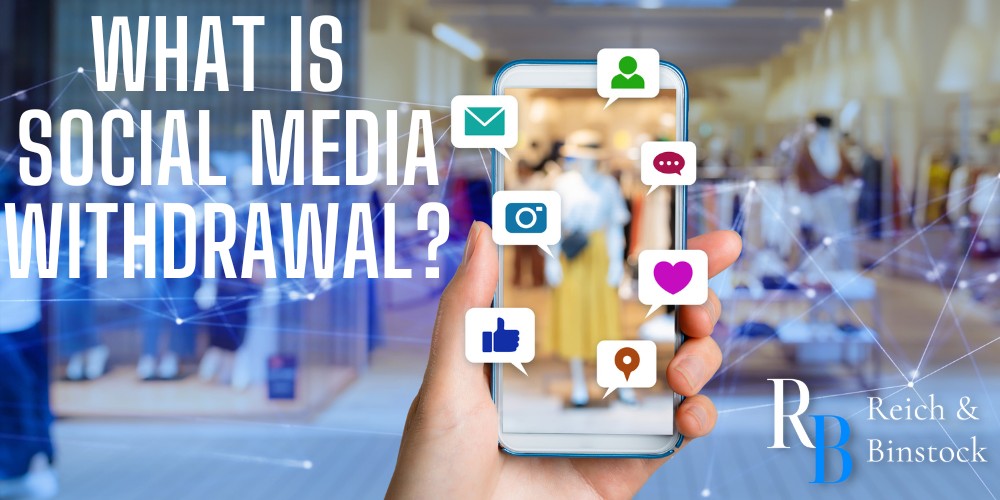Social media is an online platform allowing people to communicate with others and is used daily by millions worldwide. The majority of users can engage with these platforms without incident. However, a small portion of people use these apps in an addictive manner.
Social media platforms use algorithms to increase social media use and encourage addictions. Addiction and withdrawal from social media can harm a person’s health, and younger people are particularly vulnerable. An addiction to social media can lead to life-altering injuries, like self-harm, eating disorders, and even suicide. When a social media addict tries to refrain from using these platforms, they can begin to experience withdrawal symptoms similar to that of a drug user.
If you or a loved one has suffered harm due to social media, you have the right to seek compensation. The product liability attorneys at Reich & Binstock are ready to represent you in your fight against social media companies. To schedule a consultation about your social media addiction lawsuit, call us today at 713-622-7271.
What Is Social Media Withdrawal?
Like other compulsive behaviors, social media can become addicting. When you stop this addictive behavior, it can cause addicts to experience withdrawal.
Social media withdrawal, to put it simply, occurs when a social media addict abstains from using social media platforms and begins to face mental, emotional, or habitual struggles because of it. Even quitting social media for a week can lead to severe withdrawal symptoms.
What Are the Symptoms of Social Media Withdrawal?
People going through a social media withdrawal might experience symptoms including:
- The strong compulsion to use social media
- Increase in boredom
- Significant mood shifts
Social Media Withdrawal Symptoms in Younger People versus Older People
A study published in the International Journal of Mental Health and Addiction showed that in a group of 18 to 30 years old, the younger users that primarily used their mobile devices for social media actually showed lower levels of stress when their mobile device was taken away.
Social Media Withdrawal Symptoms in Older People
In this same study, the older participants showed increased stress levels when their mobile device was removed. The study also found that older users that use their mobile devices for things other than social media had lower stress levels when their mobile device was taken.
These differences between younger and older users might be due to why they use social media. It states that older users are more prone to stressful lives and use social media to escape. In contrast, younger users are on social media seeking excitement.
Overall, while the study did find differences in the withdrawal symptoms depending on their ages, there is still a lot of research left to be done.
How Long Do Social Media Withdrawal Symptoms Last?
After withdrawing from social media, you might begin to see improvements within the first week or two. If your withdrawal symptoms continue after several weeks or months, you may need to seek professional help.
What Causes Social Media Withdrawal?

Social media can become an addiction because these apps trigger the human brain to release dopamine, the brain chemical that relates to reward and motivation. When you use social media platforms like Facebook, TikTok, Instagram, or Twitter, the brain experiences increased dopamine levels. As we continue using social media and experience that dopamine release, we begin to associate that feeling with social media. Whenever we’re not using social media, our brain craves that dopamine high, which makes us constantly reach for our mobile devices.
Social media usage has a similar effect on the user’s brain to the effects of recreational drug use. It is suggested in research out of Michigan State that repeated exposure to snaps, likes, posts, and shares affects users’ brain chemistry in a way that is similar to the use of cocaine.
How Does Social Media Addiction Lead to Withdrawal?
Social media withdrawal happens when a person addicted to social media stops using it. Since social media triggers the brain to release dopamine, abstaining from it causes reduced dopamine levels, leading to withdrawal.
What Are the Consequences of Social Media Addiction?

When you have an addiction to social media sites, you can experience adverse symptoms other than withdrawal. Social media addicts suffer both personal and psychological consequences that include:
- Neglecting real-life relationships
- Hiding excessive social media use from others
- Fear of missing out (FOMO)
- ADHD symptoms
- Escapism thought patterns
It’s important to seek help if you believe you have a social media addiction. A digital detox can help with excessive patterns of social media use, as the overuse of social media can lead to additional mental health issues.
How to Handle Withdrawing from Social Media

The urge to constantly be on a social media app can harm us mentally, socially, and emotionally. Instead of being with others face-to-face, anyone experiencing withdrawal from social media might dedicate their free time to engaging with others in the digital world. When you quit social media, you could experience the fear of missing out (FOMO) or thinking about what others are doing on social media. This distraction can affect your job and the ability to have normal in-person relationships.
Like all habits, this one can be broken as well. Below are a couple of tips on dealing with withdrawal.
- Avoid using your mobile devices before bed: This withdrawal can act as an invisible force that makes you feel compelled to search social media. When it’s time for bed, place your device somewhere you won’t be tempted to reach for it and stick to it.
- Uninstall apps or turn off notifications: While deleting your online accounts may be impossible, we can reduce our dependence on them. We remove the urge to check social media every time our phone goes off by removing apps or notifications. In fact, a recent study showed that 70% of people check their phones within five minutes of receiving a notification.
How Can I Protect Myself from Social Media Addiction?

Becoming aware of social media and its addictive qualities can help you take the proper steps toward avoiding addiction. Below are some ways to prevent becoming addicted to social media.
- Create time limits for social media use: Try to limit your use of social media daily. Only allow yourself thirty minutes or an hour of social media use. Try to lower your time limits if you use it more than that. There are tracking methods to monitor your social media use, like apps or setting a simple timer.
- Don’t use social media when you’re emotional: Visiting a social media website when you feel anxious, sad, or angry can worsen the addiction. Instead, try to do an activity that will make you feel better, such as talking to a friend or going for a walk.
- Be aware of what triggers you to use social media: Certain things like boredom, procrastination, or loneliness can trigger your urge to check social media apps. When you become aware of your triggers, you can be better prepared to avoid them.
- Find other activities instead of checking social media: When you sense the urge to use social media, try taking a walk or reading a book. If you want to check up on what your friends or family members are doing, call them.
- Don’t compare yourself to others: Looking at other people’s lives on social media can make it easy to compare yourself to them. It’s important to remember that people only post the best parts of their lives on their social media accounts. So comparing yourself to what you see online isn’t a fair comparison.
- Set boundaries: In addition to setting time limits on your social media usage, you could limit what you see. Maybe unfollow anyone that posts triggering or harmful content.
If you’re still struggling with social media use, it might be time to take a social media detox.
Do You Have a Social Media Addiction Claim?

There are already pending lawsuits against Meta (Facebook and Instagram), Snap (Snapchat), ByteDance (TikTok), and Google (YouTube) that involve issues surrounding social media addiction and adolescents. If you or a loved one has been addicted to social media and suffered psychological or physical harm, you could be entitled to financial compensation. Some examples of harm related to social media usage are suicide/self-harm, anxiety, depression, and eating disorders.
When you file a lawsuit against these large social media companies, you show that it’s not ok for them to continue encouraging such addictive and dangerous behaviors. The Reich & Binstock personal injury lawyer team will fight the social media companies on you and your family’s behalf.
Contact the Product Liability Lawyers at Reich & Binstock
After years of using social media, we better understand how it can negatively affect a person’s mental and physical health. It’s time for social media companies to be held liable for the damages they have caused. If social media have harmed you or a loved one, you deserve compensation, like any other product liability or personal injury case. To discuss your case with one of our attorneys at Reich & Binstock, call us today at 713-622-7271.













